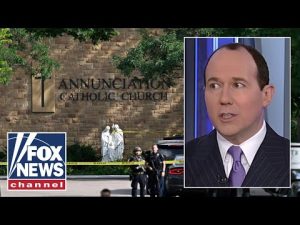In the bustling halls of the Senate, two names have recently emerged from the shadows of partisan politics, ready to shake things up — Robert F. Kennedy Jr. and Tulsi Gabbard. Both figures, having once donned the blue cape of Democrat, are now making waves within the Republican arena, showcasing a rather interesting blend of diversity and disruption within the political landscape. As news of their confirmation votes makes headlines, the excitement surrounding their potential roles is palpable, hinting at a transformation of the status quo that hasn’t been seen in quite some time.
First up, Kennedy’s recent success at the Senate Finance Committee gives credence to a growing coalition backing him. His entrance into the Republican fold is not without controversy, especially considering his outspoken views on vaccines and health policies. However, supporters argue that Kennedy is more focused on reforming health and human services than dismantling the critical advancements in medicine. His commitment to safety and efficacy in health care proposes a balanced approach that aims to address concerns without jeopardizing existing medical frameworks. In essence, he’s looking to make America healthy again, and that message is resonating with many who have felt overlooked by traditional political rhetoric.
As for Gabbard, her anticipated passage from the Senate Intel Committee reinforces the message that divergent voices are welcome in the Republican Party. With a reputation for challenging the establishment, her experience and insights are seen as crucial for reforming intelligence operations, especially in an era where political maneuvering has resulted in intelligence failures. There’s a sense that her bipartisan appeal could usher in a new chapter of accountability, allowing national security to transcend partisan divisions.
Looking at the bigger picture, the backing for both Kennedy and Gabbard signifies an evolving Republican Party willing to embrace non-traditional candidates who can attract a broader spectrum of voters. The coalition crafted by President Trump, featuring these non-Republicans, underscores a strategic pivot that could redefine the party’s identity moving forward. After all, it’s not every day that a party welcomes former Democrats with open arms, demonstrating that the GOP is keen on fostering diversity in thought and approach.
However, the stakes are high. If these nominees manage to clear the Senate with bipartisan support, it would certainly be a win for Trump’s persistent agenda to challenge the establishment. Yet, the concern among skeptics remains about the opinions these two continue to hold. For many Republican insiders, a failure to fully support these nominations could spark disappointment among constituents, especially those who view Trump’s choices as essential to restoring faith in the party’s leadership.
As the confirmation process unfolds, a broader question lingers in the air: can these newcomers effectively bridge the divide, and will the American people rally behind them? If the energy from their respective bases is any indicator, the answer might very well be ‘yes.’ As we continue to witness unlikely alliances blossom in Washington, one thing is clear: the political landscape is evolving, and it seems ready to rumble with fresh ideas and reform-minded individuals who are not afraid to roll up their sleeves and get to work. Here’s hoping they remember their sunscreen — it’s a bright new world ahead!







